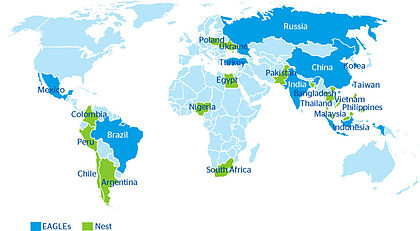by Bill Hall,
from Money & Markets,
2/5/14:
With U.S. stocks posting their worst monthly decline since May 2012, many everyday investors are asking: What’s going on? Why the turmoil?
once again, we are faced with the threat that chaos overseas will jeopardize the Federal Reserve’s aggressive money-printing policies and, in turn, cause the world’s financial markets to unwind.
First, it was the PIIGS — Portugal, Italy, Ireland, Greece and Spain. Now, it’s the Fragile Five — Brazil, India, Indonesia, Turkey and South Africa. And, next, it could be the Exposed Eight — the Fragile Five plus Hungary, Poland and Chile — that finally bursts Ben Bernanke’s bubble.

Recall that in 2012, the PIIGS were blamed for the euro-zone crisis that almost derailed the global financial recovery as economies climbed out from under the great collapse of 2007.
Had it not been for some quick, easy-money sleight of hand by the European Central Bank, led by Mario Draghi, it’s almost certain that the world economy would have ended up crashing onto the rocks because of the PIIGS financial indiscretions.
This time around it’s the Fragile Five and, possibly, the Exposed Eight that could prove to be our undoing. That’s because emerging markets are facing an unholy trinity: a slowdown in China, tapering by the Fed and political instability as well as social unrest in developing countries. And it’s the Fragile Five and the Exposed Eight that are causing the most concern — and they should be especially worrisome to you, too.
What’s going wrong in these countries?
First, economic growth has slowed. As a group, developing countries grew on average about 6.5 percent over the past decade. In 2013, their economic growth rate was about 4.5 percent, with economic activity forecast to rise very little, if at all, in 2014. What’s more, China recently reported its first decline.
Second, political upheaval is another thing they have in common. All face political elections during 2014, which means much-needed economic reforms are even less likely. The Fragile Five have seen their currencies fall 15 to 20 percent over the past year, exposing such disturbing issues as corruption, lack of corporate governance and lending practices that favored the political and economic elite.
Third, cheap money is drying up. Last week, the Fed reaffirmed that it would continue pulling back on its bond-buying program in the amount of $10 billion. That means the U.S. central bank will pump $65 billion a month in the U.S. economy, $20 billion less than in December. The Fed’s actions, combined with reported instability in China’s shadow-banking system, could set off a ripple effect of tight credit throughout the emerging world, which is still reliant on foreign sources of capital.
Considering all of those factors, it’s the threat to global economic growth that Wall Street is most concerned about. With emerging markets now under pressure, Wall Street is growing increasingly concerned that economic expansion in the developing world may fall well short of expectations.
More From Money & Markets:







